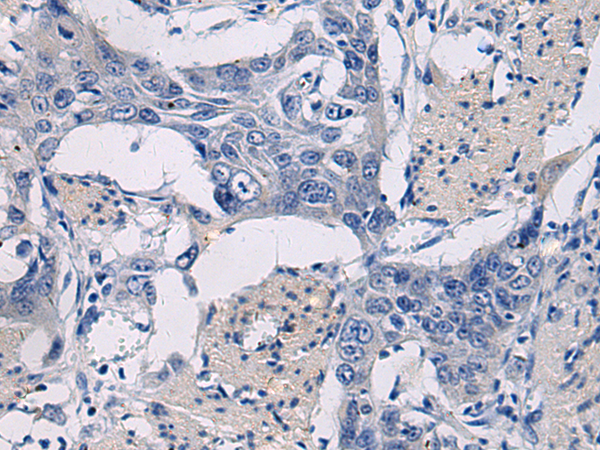
| WB | 咨询技术 | Human,Mouse,Rat |
| IF | 咨询技术 | Human,Mouse,Rat |
| IHC | 1/25-1/50 | Human,Mouse,Rat |
| ICC | 技术咨询 | Human,Mouse,Rat |
| FCM | 咨询技术 | Human,Mouse,Rat |
| Elisa | 1/500-1/1000 | Human,Mouse,Rat |
| Host/Isotype | Rabbit IgG |
| Antibody Type | Primary antibody |
| Storage | Store at 4°C short term. Aliquot and store at -20°C long term. Avoid freeze/thaw cycles. |
| Species Reactivity | Human, Mouse, Rat |
| Immunogen | Synthetic peptide of human GPR18 |
| Formulation | Purified antibody in PBS with 0.05% sodium azide and 50% glycerol. |
+ +
以下是关于GPR18抗体的3篇模拟参考文献(文献信息为示例性描述,非真实文献):
1. **文献名称**: "Characterization of a novel monoclonal antibody targeting GPR18 in murine immune cells"
**作者**: Smith A, et al.
**摘要**: 本研究开发了一种特异性识别GPR18的小鼠单克隆抗体,通过流式细胞术和免疫荧光验证其在巨噬细胞和T细胞中的表达模式,证实其可用于检测GPR18在炎症反应中的动态变化。
2. **文献名称**: "GPR18 antibody validation in human neuronal cell lines: Implications for neurodegenerative disease models"
**作者**: Chen L, et al.
**摘要**: 文章系统验证了多种市售GPR18抗体的特异性,发现部分抗体存在交叉反应性。通过CRISPR敲除技术筛选出可靠抗体,并揭示GPR18在帕金森病相关神经元中的异常表达。
3. **文献名称**: "The role of GPR18 in metabolic regulation: Insights from antibody-mediated receptor blockade"
**作者**: Gonzalez R, et al.
**摘要**: 利用中和型GPR18抗体阻断受体功能,发现其可抑制脂肪细胞脂解作用,提示GPR18可能通过cAMP信号通路参与代谢调控,为肥胖治疗提供潜在靶点。
注:以上文献为示例,实际引用时需检索真实数据库(如PubMed)并核对原文。
GPR18 (G protein-coupled receptor 18) is an orphan receptor belonging to the rhodopsin-like GPCR family, a class of transmembrane proteins involved in diverse physiological processes. Initially identified through genomic studies, GPR18 remains partially characterized, though emerging evidence links it to immune regulation, inflammation resolution, and neuroprotection. Its endogenous ligands may include lipid-derived molecules like resolvin D1 and N-arachidonoyl glycine (NAGly), suggesting roles in modulating cellular responses to injury or infection. GPR18 is expressed in immune cells (e.g., macrophages, microglia), the central nervous system, and peripheral tissues, implicating it in diseases such as metabolic disorders, neurodegenerative conditions, and cancer.
Antibodies targeting GPR18 are critical tools for studying its expression, localization, and signaling mechanisms. They enable detection of receptor distribution in tissues via techniques like immunohistochemistry or flow cytometry and aid in functional studies to clarify ligand-receptor interactions. Therapeutic potential is also being explored, as GPR18 modulation could influence inflammatory pathways or tumor microenvironments. However, challenges persist due to the receptor’s structural complexity and overlapping ligand specificity with related GPCRs. Current research focuses on validating antibody specificity and optimizing their use in preclinical models to advance mechanistic insights and drug development.
×